On October 31st 2013, the Palestine-Israel Journal (PIJ) together with the Friedrich Ebert Stiftung organized a conference following the publication of its latest issue: “A Middle East without Weapons of Mass Destruction.” In May 2010, the NPT (Nuclear Non-Proliferation Treaty) Review Conference meeting in New York resolved that an international conference on a Weapons of Mass Destruction Free Zone in the Middle East should be held before the end of 2012. Although the conference was postponed, the issue of weapons of mass destruction remains on the international agenda and the state of international affairs today actually makes it a very timely issue. Therefore, the new issue of the Palestine-Israel Journal is an important resource for anyone concerned with the problem of Weapons of Mass Destruction in the Middle East.
Daniel Kurtzer: The necessity of addressing the issue of a Weapons of Mass Destruction Free Zone
The evening began with some opening remarks from Ingrid Ross, Director of the Friedrich Ebert Stiftung office in Jerusalem, followed by introductory comments by PIJ co-editor Hillel Schenker.He noted the presence of a representative of the Japanese Embassy, the only country to have suffered directly from nuclear weapons, and of a representative of the Embassy of Finland, who was going to report on the conference proceedings to the Finnish Foreign Ministry and Ambassador Jaakko Laajava, the facilitator for the international conference on a Nuclear and WMD Free Zone in the Middle East.
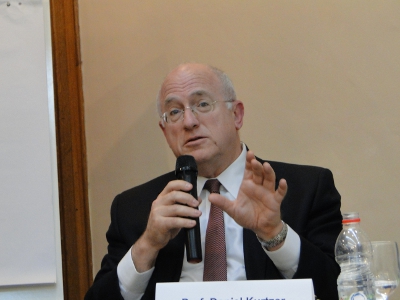
PIJ Editorial Board member Dr. Adnan AbdelRazzek was the moderator of the panel discussion. After presenting the significance of this issue, he gave the floor to former U.S. ambassador to Egypt and Israel Prof. Daniel Kurtzer who said that after being out of bounds for a long time, there is now a discussion going on about a Middle East Weapons of Mass Destruction Free Zone. The debate on this issue is still unfolding despite the background of Israeli security and the Middle East peace process. Kurtzer presented three different Israeli viewpoints. A first view is that Israeli security needs require a long period of implementation after the treaty has been sign so that even discussing a Weapons of Mass Destruction free zone with the Arab world is premature. A minority of Israelis believe that they need a peace treaty before accommodating a Weapons of Mass Destruction Free Zone, but that dialogue is still relevant before peace. Finally, and this is the most common viewpoint amongst Israelis according to Kurtzer, Israel will never feel secure enough to give up its nuclear and chemical weapons, which constitutes a conceptual and psychological barrier to discussion. Regarding the Israeli-Palestinian peace process, Kurtzer pointed out that it is a pathway to peace for the whole region: if Israel and Palestine settle their dispute, the Israeli security environment will be much stronger. Despite the ongoing negotiations that are now taking place thanks to Secretary of State Kerry, no success is forecasted. To help bring about a breakthrough, it is necessary to start addressing the issue of a Weapons of Mass Destruction Free Zone in the Middle East.
Prof. Frank von Hippel: A fissile material free zone
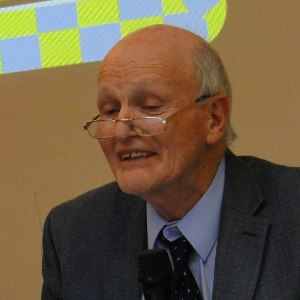
As Senior Research Physicist and Professor of Public and International Affairs emeritus at Princeton University, Prof. Frank von Hippel addressed during his speech the issue of a fissile material free zone, accompanied by a detailed power point presentation. Since 2006, the mission of the International Panel on Fissile Material is to reduce the amount of nuclear material plutonium and highly enriched uranium, as a way of promoting disarmament and preventing the proliferation of weapons. The steps proposed by the International Panel on Fissile Material are suitable for the Middle East. As plutonium is used in both Israel and Iran, these are the countries of focus, however preventing proliferation is as big an issue as is ending the practice of using plutonium as fuel. Concerning the issue of a Weapons of Mass Destruction Free Zone, Von Hippel stated that a regional organization could be an umbrella for a multinational organization in the Middle East. Von Hippel’s idea is therefore to contemplate the idea of a Middle East without plutonium, high enriched uranium, without reprocessing plants and no national enrichment plants, and he only sees the Middle East as a starting point: “We are not singling out the Middle East but considering the urgency, the Middle East would be a good place to start.”
Dr. Reuven Pedatzur: A pessimistic approach to the possibility of a discussion
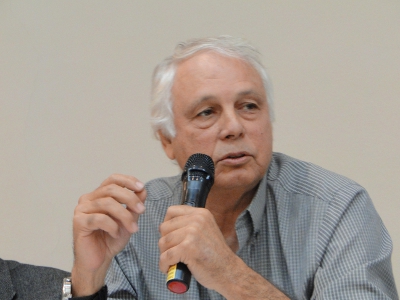
Dr. Reuven Pedatzur is director or the S. Daniel Abraham Center for Strategic Dialogue at the Netanya Academic College. According to him, there is no official Israeli perspective, no real public debate on nuclear issues, which seem to be a taboo in Israel. He declares that whilst trying to present an Israeli perspective, all his knowledge is based on foreign sources as there is censorship on this sensitive issue in Israel. Pedatzur declared that given the current state of affairs, the proposal of a Weapons of Mass Destruction Free Zone in the Middle East is premature because the necessary conditions is for Israel to admit its military nuclear program, and he cannot see any kind of change in Israeli policy in the near future, because Israel does not feel secure enough. Therefore opaque nuclear deterrence is a pillar of Israeli military strategy. Moreover, it is unlikely to create a Weapons of Mass Destruction Free Zone with the ongoing war in Syria and the use of chemical weapons, especially if you add to this the instability of Egypt, Iran’s nuclear program and the unresolved Palestinian-Israeli conflict.
Pedatzur predicts that the only way Israel will agree to continue discussing this issue is under pressure from the U.S. administration, which happened in the nineties for a short while, but U.S. incentive to put pressure on Israel this time seems far away.
Peter Weiss: “Sometimes successes that were totally unexpected happen”
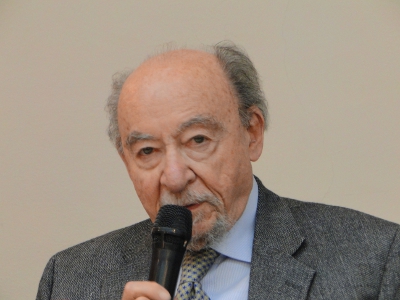
Peter Weiss is Co-President of the International Association of Lawyers Against Nuclear Arms and was counsel to the government of Malaysia in the nuclear weapons case of the International Court of Justice. “Sometimes successes that were totally unexpected happen” said Weiss. However, he agrees with the unlikeliness of Israel making it possible for the existence of a Weapons of Mass Destruction Free Zone. According to Weiss, an exclusive focus on the Middle East for the establishment of a Weapons of Mass Destruction Free Zone is somewhat misplaced: “I would like to live in a world free of Weapons of Mass Destruction, so going for the Middle East is selfish.” Weiss does agree that in the near future, Israel will not agree to anything that would result in the country giving up both its chemical and its nuclear weapons. He noted that Sharon Dolev, Director of the Israeli Anti-Nuclear Movement, wrote in her article in the the PIJ issue not to give up on the Middle East, but to still be engaged in promoting an international convention banning all nuclear weapons for good.
Peter Weiss expressed optimism concerning the advancement of the issue of a Weapons of Mass Destruction Free World. “This year has seen serious progress on a Nuclear Weapons Free World”, he declared. First of all, in January, a conference was held by the foreign minister of Germany, creating a “framework forum for a nuclear weapons free world.” In addition, a conference was held in Norway a month later to show the world what a nuclear exchange could bring about. After a total paralysis of the Geneva commission on disarmament for the last ten to twenty tears, the UNGeneral Assembly called for “entering through the back door.” The report produced resulted in a pending UN resolution calling for the immediate commencement of the nuclear weapons convention. These procedures are giving hope to civil society and diplomats from a majority of the world's countries who desire progress.
Ziad AbuZayyad: “Any tragic nuclear event will not be limited to a specific country’s borders”
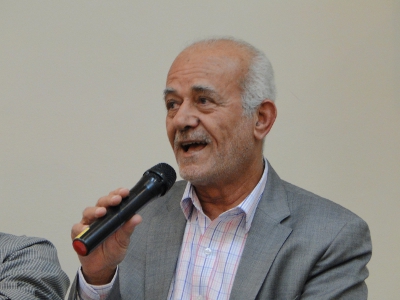
Ziad AbuZayyad is co-editor of the Palestine-Israel Journal
and was head of the Palestinian delegation to the post-Madrid Conference Arms Control and Regional Security (ACRS) Talks. According to AbuZayyad, achieving peace opens the door for a better future for the region, therefore the two issues of peace negotiations and of nuclear weapons should be approached in parallel, and not sequentially. He pointed out two positive developments, the willingness of Syria to destroy its chemical weapons and the change in the Iranian position in encouraging discussion, which should encourage Israel to start a process that can firstly end its ambiguous position, and secondly get rid of these weapons. The result of this would be a healthy climate enabling the normalization of the relationship between the countries in the Middle East. AbuZayyad firmly stated that Israel has to realize that its peace and security is not correlated with the occupation of the Palestinian land and the deprivation of the right of the Palestinian people to live in peace security and dignity: he believes that putting an end to the occupation would change the whole mood in the region and therefore contribute positively to the establishment of peace. After listening to the other discussant’s speeches, AbuZayyad finally pointed out that a discussion about the danger of nuclear weapons is also necessary, that talking about nuclear weapons in the context of security is not enough: these arms are unique due to their destructive potential and to the long-term effects of their use on the health of populations and on the environment. This very last point puts in the same basket all of the countries in the Middle East: any tragic nuclear event will not be limited to a specific country’s borders. This should be the strong asset justifying the urgency of establishing a Weapons of Mass Destruction Free Zone in the Middle East, and this can be obtained by raising awareness about the catastrophic humanitarian consequences of nuclear weapons. Civil society must fulfill their responsibility side by side with the governments and with the future generations.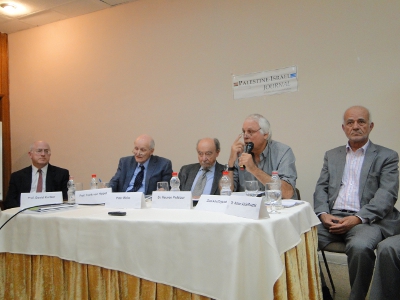
The panel discussion was followed by a lively exchange, with questions and comments from the audience which consisted of Israelis, Palestinians and internationals. Among the Israelis was Mordechai Vanunu, who sat silently in the back of the hall.
